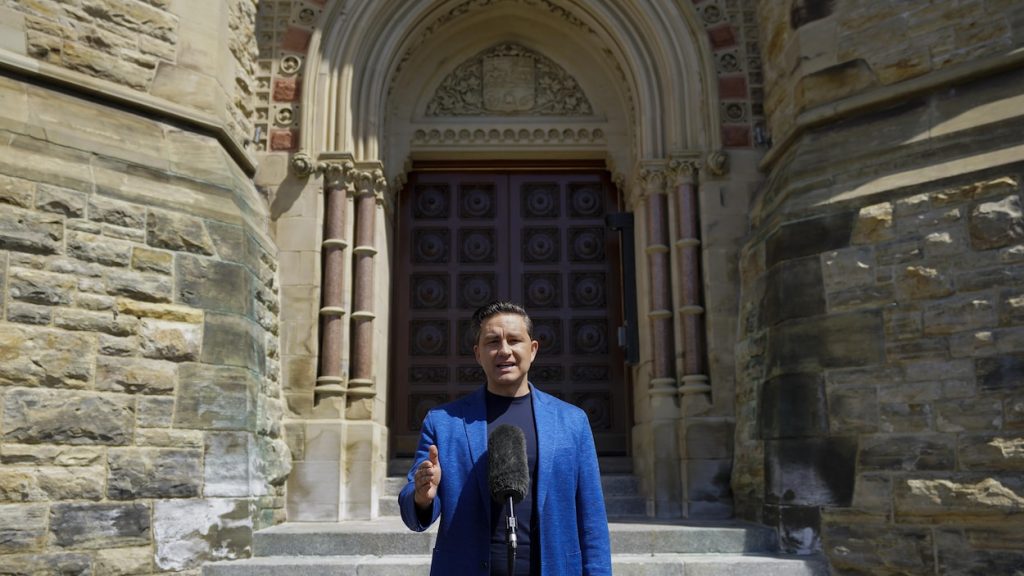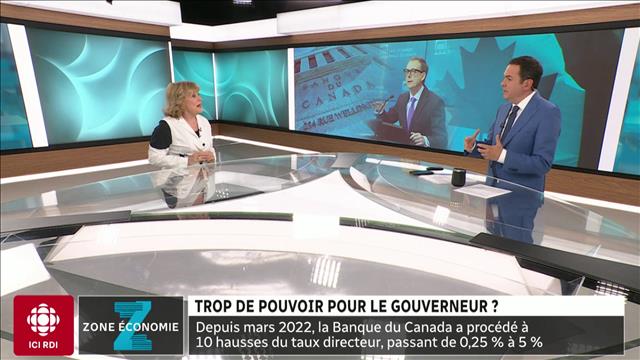
“In 2025 and 2026, if interest rates are still very high, I foresee a catastrophe worse than what Americans experienced in 2008,” said Pierre Poilivre, leader of the Conservative Party of Canada, in an interview with Joël-Denis Bellavance. there pressAugust 28. This projection is exaggerated.
All economists are predicting a rate cut in 2024. The reduction, which was earlier scheduled for late 2023, may finally occur in the first half of 2024. In talking about much higher rates in 2025 and 2026, the leader of the official opposition in Ottawa was talking about a highly unlikely scenario, according to estimates by private sector economists.
Then, it is alarmist to provoke a crisis worse than the 2008 crisis in the United States. At that time the real estate crash among our neighbors to the south was a disaster for millions of Americans. This is attributed to two main factors: the granting of very risky mortgages by questionable lenders and the creation of financial products based on these very risky mortgages, albeit of high quality.
We are miles away from this scene. Today, the main problem is home loan. In this regard, Pierre Poilivre is right to worry that many households acquired property at high prices and low interest rates during the pandemic and that they now have to make up for the rising rates.
So, yes, many families find themselves in precarious situations. But from there to provoking a crisis worse than 2008, a bubble bursting or a systemic financial problem, there is a line that the Conservative leader crosses and it doesn’t match the facts.
The facts
About one-third of households in the country are home owners with mortgages. The rest of the people are renters or owners without a mortgage. And 10% of households have variable rate mortgages, with the majority having a fixed payment, but with the portion paid in interest increasing as rates rise.
When renewing their fixed or variable rate mortgage, households may end up paying more due to higher interest rates. Rates will further decrease in 2024, I remind you. And I also remind you that the rates have nothing to do with what we were experiencing in the 1980s.
Financial institutions definitely offer their customers to review the tenor of their loan to avoid excessive increases in payments. According to Sebastian McMahon, chief economist at IA Financial Group, providing such flexibility is in borrowers’ interests, but it also applies to banks that don’t want to end up with thousands of sets of keys to foreclosed homes.
In addition, the number of bankruptcy filings in the country is increasing, but we have not yet returned to pre-pandemic levels. Sebastian McMahon believes that bankruptcy will continue beyond the 2019 plateau, but this does not mean that the risk has become organized and the situation is approaching crisis.
It is important to understand this. A lot of people are losing out from inflation and rising rates, no doubt about it. But will it cause a Great Recession, a crisis, a housing bubble, a systemic crash and… worse than 2008 in the United States?
It is clear that access to property is not improving, as Pierre Poilivre is right to point out. But at the same time it is not very new. It is for this reason that the current government is trying to facilitate access to property by creating a new product, which will appear this year: CELIAPP, a tax-free savings account for the purchase of a first property.
It’s also important to note that the Toronto and Vancouver markets skew the data for the entire country in terms of home ownership. Markets like Quebec, Calgary or Halifax did not experience significant growth in real estate prices between 2012 and 2020.
Yes, access to property is difficult in some major centres, but this is not the case everywhere. It’s all about access to complex housing. And here, interest rates are not as important as the availability and lack of houses under construction.
Shake up the Bank of Canada
Perhaps most troubling about Pierre Poilievre’s intervention are his comments that give the impression that he wants to control the Bank of Canada. A central bank conducts a monetary policy which is independent of the state and should remain so.
Pierre Poilivre has previously raised the possibility of removing the governor if the Bank of Canada is prime minister. He does it because he doesn’t agree with her decisions. And today, he said he would pursue a policy to reduce inflation and get the Bank of Canada to cut interest rates.
Canada also has one of the strongest countries in the world, AAA credit rating, very stable financial sources and institutions. Following the path of Donald Trump, who has constantly attacked Turkey’s Federal Reserve Chairman, or Recep Tayyip Erdogan, by threatening to fire the governor of the Bank of Canada or seeking looser monetary policy. It sacked its central bank governor demanding rate cuts despite runaway inflation.
Diane Bellemare is the inspiration
Pierre Poilievre would benefit from drawing inspiration from Senator Diane Bellemare’s proposals in his criticism of the Bank of Canada. The senator said the central bank should be more transparent. she asks him in a letter published Thursday The destinyTo better explain its decisions and above all to explain the economic and financial cost of interest rate hikes.
By raising rates, the Bank of Canada is harming business creation, the energy transition, housing, according to the senator, and we need to inform the population, she said. According to Diane Bellemare, we need to change the Bank of Canada Act and review the inflation target at 3% and no longer at 2%.
This type of feedback is thoughtful and intended to improve the central bank’s processes. Diane Bellemare seeks to consolidate the organization of the Bank of Canada, to make it better and more open, while Pierre Poilivre’s proposals appear to be a form of intervention in monetary policy. The distinction is important.
The Leader of the Official Opposition is right to question government spending, productivity and innovation policies and Canada’s attractiveness. But by attacking the Bank of Canada, he is confusing the public about the central bank’s work and undermining an institution that is at the heart of the country’s financial stability.

Interview with Independent Senator Diane Bellemare





More Stories
Sportswear: Lolle acquires Louis Garneau Sports
REM is still innovative enough to foot the bill
A trip to the restaurant with no regrets for these customers